-
Home
-
Shop
New -
Explore
-
Support
-
Track Order
Feb 27, 2023
Author:Lisa Martinez
Wondering why your cat eats a little then stops? Are you trying to find out how to get her appetite back?
Cats are known for being good eaters. So, it's natural to be a bit concerned if your kitty seems less interested in her meals. Decreased appetite in cats can be stressful for feline parents and may indicate an underlying medical condition. In this post, we'll learn why cat eats a little and then stops. We will also share a few tricks to encourage your cat to eat better. Let's get started:
If your cat doesn’t eat one meal but then returns to her normal eating habits, this usually isn’t a concern. But if your cat keeps on eating a little at a time, you should identify the reason why your cat eats only a little. Your feline buddy may not be feeling well and is in some discomfort.
Here are some reasons why your cat eats very little at a time:
Regular feeding routines allow your cats to be prepared for the food they'll receive. Lack of feeding routine makes cats only eat a little at a time. Changes to their feeding routine can also cause your kitty to lose their appetite. WOpet automatic pet feeders are useful to help your cats stink to a healthy feeding routine.
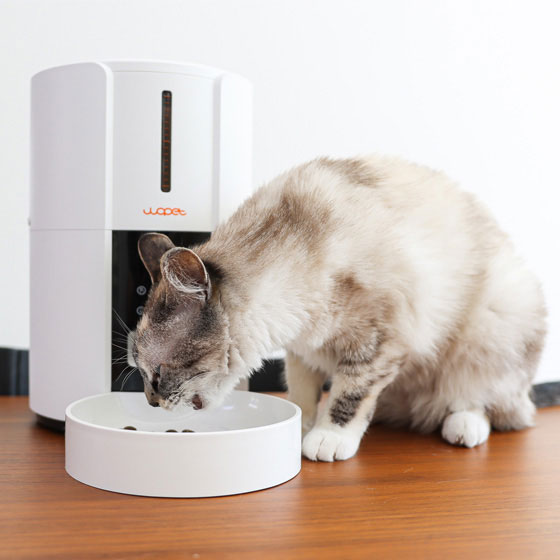
Loss of appetite is the main indicator that your cat has some medical issues. Common medical reasons include vaccination side effects, dental issues, parasites, oral ulcers, some trauma or injury, and much more.
If your cat doesn't have a visible medical problem which is keeping her from chewing and ingesting food, then it might be an underlying disease. In such cases, your cat may want to eat but is unable to due to pain or discomfort.
The underlying health issues include kidney disease, pancreatitis, gastrointestinal diseases, olfactory problems, and other infectious diseases that affect their entire nervous system. All of the above diseases can be very serious for your kitty.
Your cat’s problem could just be that you have changed their diet and they're fussy about the food they will eat. Refusing to eat their food you provide is your cat's way of expressing their dislike.
Cats can take some time to adjust to their new diet. If you have recently made a change to your cat's diet, that might explain your cat’s reluctance to eat. Many cats are notoriously picky eaters. Even if your kitty was eating the same diet for months, it’s possible she no longer likes the taste of it.
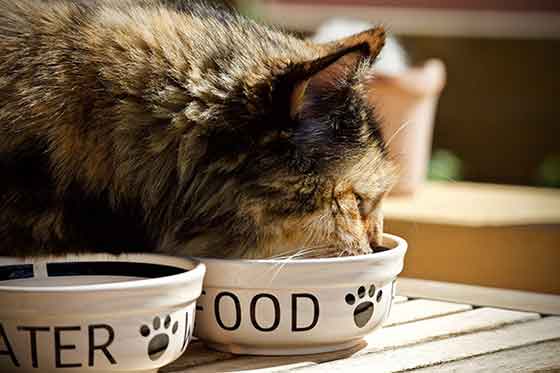
Anxiety, stress, or depression can cause decreased appetite in some cats, just like it can in people. Even very small things can produce anxiety in cats and cause them to eat a little then stop. Remember that what you think is stressful is different from what your cat may see as stressful.
Changes in your cat’s environment, such as new pets or people in the house, traveling, storms, or loud noises can trigger anxiety and may make your kitty less likely to eat.
Cats sometimes try to eat certain things they shouldn’t. Such items include pieces of small toys, rubber bands, and string. These foreign objects can get stuck somewhere in your cat’s digestive system and cause an obstruction. This leads to feelings of nausea and lack of appetite.
Other symptoms of digestive obstruction include fatigue, weight loss, drooling, vomiting, pain, and reduced bowel movements.
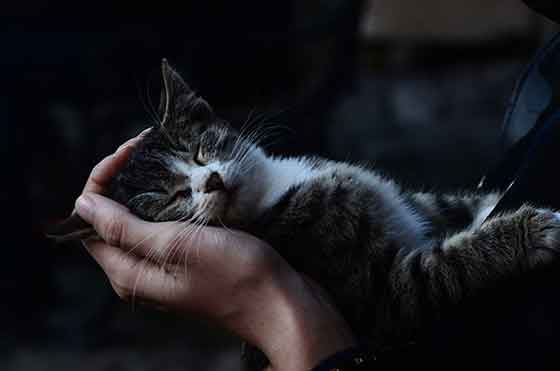
Too many treats can interfere with your cat's natural appetite for her regular meal. Treats should make up just 5 to 10 percent of your cat’s daily calorie intake. This will depend on your cat’s breed, age, metabolism, health, and level of fitness. Also, too many treats can lead to weight gain and obesity in cats.
Cats are smart enough to learn that if they don’t eat their food right away, they might get some delicious treats instead. You must ensure that treats should only complement your feline’s regular main meals and not replace them
Cats in heat may have a decreased appetite and that is considered normal.
Early in pregnancy, your cat may have a reduced appetite. If your feline pal is in the middle or late part of her gestation, she eats a little at a time. This is because her stomach has less room to expand due to the presence of kittens. Your pregnant cat should make up for this by eating a smaller amount more frequently.
If your kitty usually eats large portions of a meal but has suddenly lost her appetite, there may be cause to worry. It might be an undiagnosed medical issue that is stopping them from eating. You could try the following tips to encourage your cat to eat better.
By setting a routine, you can help your cat know what to expect from her day. Adult healthy cats should ideally eat at least two meals each day, about 12-hours apart. Sticking to a feeding plan of meals at set times can start to anticipate mealtimes. Determine when and how often you can feed meals to your feline companion based on your schedule. Don’t leave your cat's food down all day as it establishes poor eating habits.
WOPET automatic cat feeder can schedule multiple meals in advance. You can schedule upto four meals per day. It can also connect to Wi-Fi so you can monitor your kitty from work. Its precise dispenser allows you to feed your cat its prescribed diet.
The WOPET automatic cat feeder gives you holiday flexibility. If you fancy a weekend or evening out, you can do so without any guilt feelings, knowing your beloved cat will be fed on time.
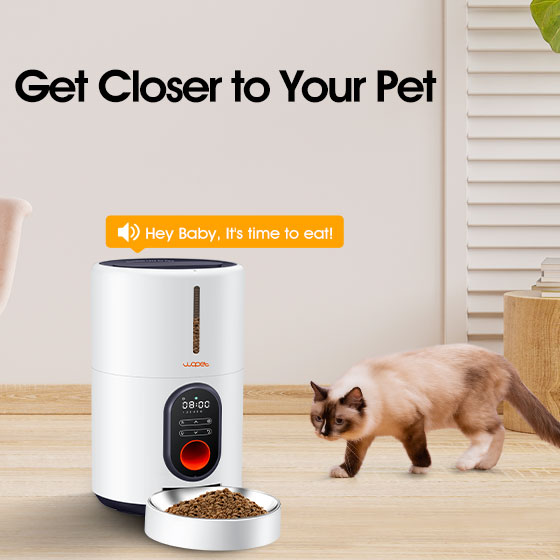
Cats are easily distracted and often struggle to concentrate on eating. This is more frequent if other pets or people are around. Try placing the food bowls in different locations. You can feed them in a quiet area of your house where they can focus peacefully on their meal.
Pick a place for the food bowl where there's not a lot of noise or foot traffic. A calm and quiet space will help keep your cat relaxed, so they can eat in peace.
Some cats like to be hand fed. When your cat eats a little at a time, you can encourage your cat by hand feeding and trying a new flavor or texture of food.
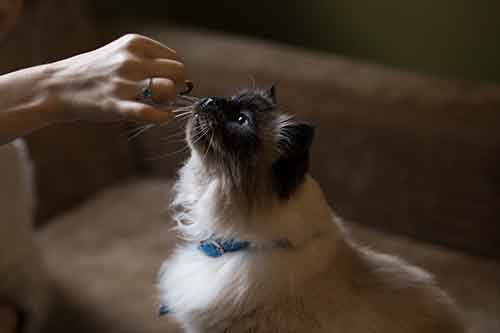
Even if your cat prefers to eat only a little, don't leave wet food out all day. This increases the risk of developing certain disease causing bacteria. After three to four hours, remove the old food and wash the food bowl with soap and water before refilling it with fresh food.
Some cats prefer the texture of moist food and might be against dry food. Many felines find wet foods quite palatable and easy to eat. You might consider adding some canned food in your cat's diet. You can also try soaking the kibbles in warm water just before feeding to soften them.
However, they come with the flaw of being a bit messier to feed. If you're using wet food, always ensure you don’t leave it out too long. If the food spoils, your cat definitely won’t want to eat it!
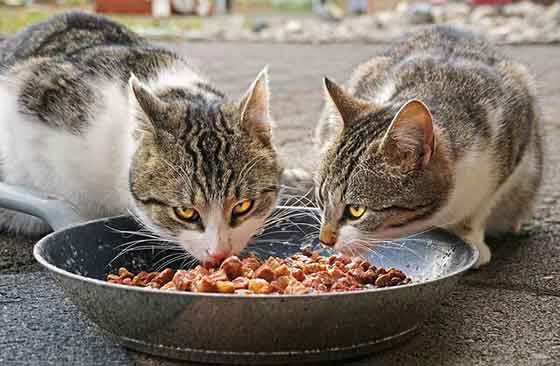
It's perfectly normal for felines to experience side effects such as lethargy, nausea, lack of appetite, and vomiting after being spayed or neutered. You can expect your pet's appetite to return in next 24 hours of post surgery.
Don’t force your kitty to eat after the procedure as their stomach might be upset and not accept any food. If you find that your cat's appetite hasn't returned within the next 48 hours, contact your vet for further assistance.
You should take your cat to the vet if you have any concerns, particularly if it’s unusual for your kitty to have a reduced appetite. This might be a new behavior indicating illness.
Popular Post
Copyright © 2024 WOPET. All Rights Reserved.